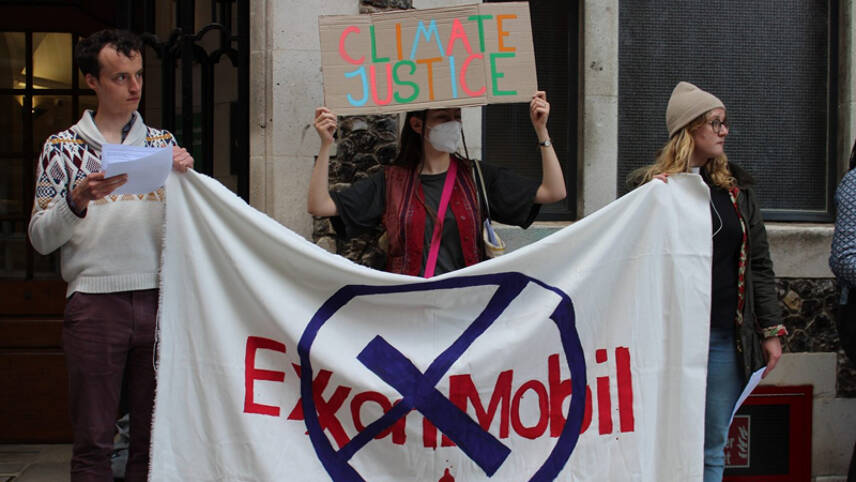Register for free and continue reading
Join our growing army of changemakers and get unlimited access to our premium content

Pictured: Operation Noah and Young Christian Climate Network protesting outside the CoE's HQ in May, calling for full fossil fuel divestment. Image: Operation Noah
The divestment drive includes five Church of England (CoE) dioceses – Birmingham, Durham, Leicester, Newcastle and Worcester; two Catholic dioceses – Leeds and Armagh; the CoE-run Leicester Cathedral; the Methodist Church of Ireland; and dozens more groups from across the UK, Ireland, Italy, Belgium, Canada, the US and Brazil.
Co-leading the commitment are the World Council of Churches, Operation Noah, Laudato Si’ Movement, Green Anglicans and GreenFaith.
In making the commitment, the organisations have stated that they can no longer support the fossil fuel industry’s “dangerous expansion plans” and “empty rhetoric” on climate change.
Religious organisations have long been spearheading the global divestment movement and putting pressure on actors including national and subnational governments to end support for fossil fuels and other sectors which harm nature and climate. It is estimated that faith institutions represent more than one-third of all global divestment commitments, representing $14trn of assets under management.
Today’s (5 July) announcement, however, comes off the back of The Guardian’s ‘carbon bombs’ investigation, which revealed in May that oil and gas majors are planning projects which would result in levels of fossil fuel extraction and use that would end all chances of limiting the global temperature increase to 1.5C.
Similarly, a June report from Carbon Tracker revealed that projects and companies sitting on three times the level of fossil fuels that could be burned in a 1.5C scenario by 2050 are currently being supported by stock markets.
The religious groups believe that these findings prove that the fossil fuel sector is not taking seriously the warnings of climate scientists and are not preparing to operate within the emissions pathways promised by governments. To the climate science point, the most recent report from the Intergovernmental Panel on Climate Change (IPCC) stated that, to have any chance of limiting the temperature increase to 1.5C, the majority of existing and planned fossil fuel extraction and combustion projects would need to end as soon as possible.
Operation Noah’s ‘Bright Now’ campaign director James Buchanan said: “Today, faith institutions around the world are making a bold and powerful statement that it is unethical to invest in an industry that is fuelling the climate, conflict and the cost-of-living crises. As 20 fossil fuel companies including BP, Shell, Exxon and Total plan to spend nearly $1trn on new fossil fuel developments which the UN Secretary-General has described as ‘delusional’, we call on the Church of England and the Catholic Church in England and Wales to choose life, divest from fossil fuel companies and invest in clean energy that will address the multiple crises we face.”
Emissions aside, the organisations signing the new commitment are pointing to the importance of accelerating the clean energy transition in ending international conflict including Russia’s war in Ukraine. They are also pointing to the IPCC’s warnings on climate resilience, with half of the global population already vulnerable to the physical impacts of warming and this proportion set to increase.
“It is our duty and responsibility to care for the environment, as God calls us to be stewards and custodians of His creation,” said the Bishop of Matlosane the Rt Revd Stephen Diseko. “Faith institutions cannot afford to continue investing in non-renewable resources such as oil and gas, given the catastrophic effects we have experienced: droughts and heavy rains resulting in floods, costing many human lives.”
The launch of the commitment comes ahead of the Lambeth Conference in Canterbury later this month. At that event, Anglican bishops from around the world will gather to discuss key issues and make new commitments.
According to the Go Fossil Free divestment tracker, more than 1,300 organisations have made public fossil fuel divestment commitments to date, with faith organisations accounting for more than one-third of commitments by numbers.
Join the conversation during edie’s Green Finance Focus Week
Readers interested in balancing divestment and engagement to achieve net-zero finance are encouraged to mark edie’s upcoming Green Finance Focus Week (18-22 July) in their diaries.
Throughout the week, the edie editorial team will be publishing a range of features, interviews, reports and more to inform and inspire readers around making sense of the ESG landscape and scaling up finance to accelerate the transition to a sustainable future. We will also be hosting a series of online Inspiration Sessions on the afternoon of Thursday 21 July, sponsored by Inspired Energy and featuring expert speakers from organisations including Natwest, Standard Chartered and the We Mean Business Coalition. Click here for details and to register.


Divest from fossil fuels, fine, but what replaces them, unless we reduce demand. This latter is not realistic.
Renewables are a “grab it when you can get it” source of energy. Wind can go down, effectively to zero, for many days on end when certain wind conditions prevail.
Last August, wind output was effectively zero for over a week.
There is room in the base electricity supply for the “renewable” source, nuclear, but this latter is not to everybody’s liking. Not myself though, clean proven, reliable, and each power plant good for about 80 years, at least. But then I was on the science side of research in it.
Richard Phillips